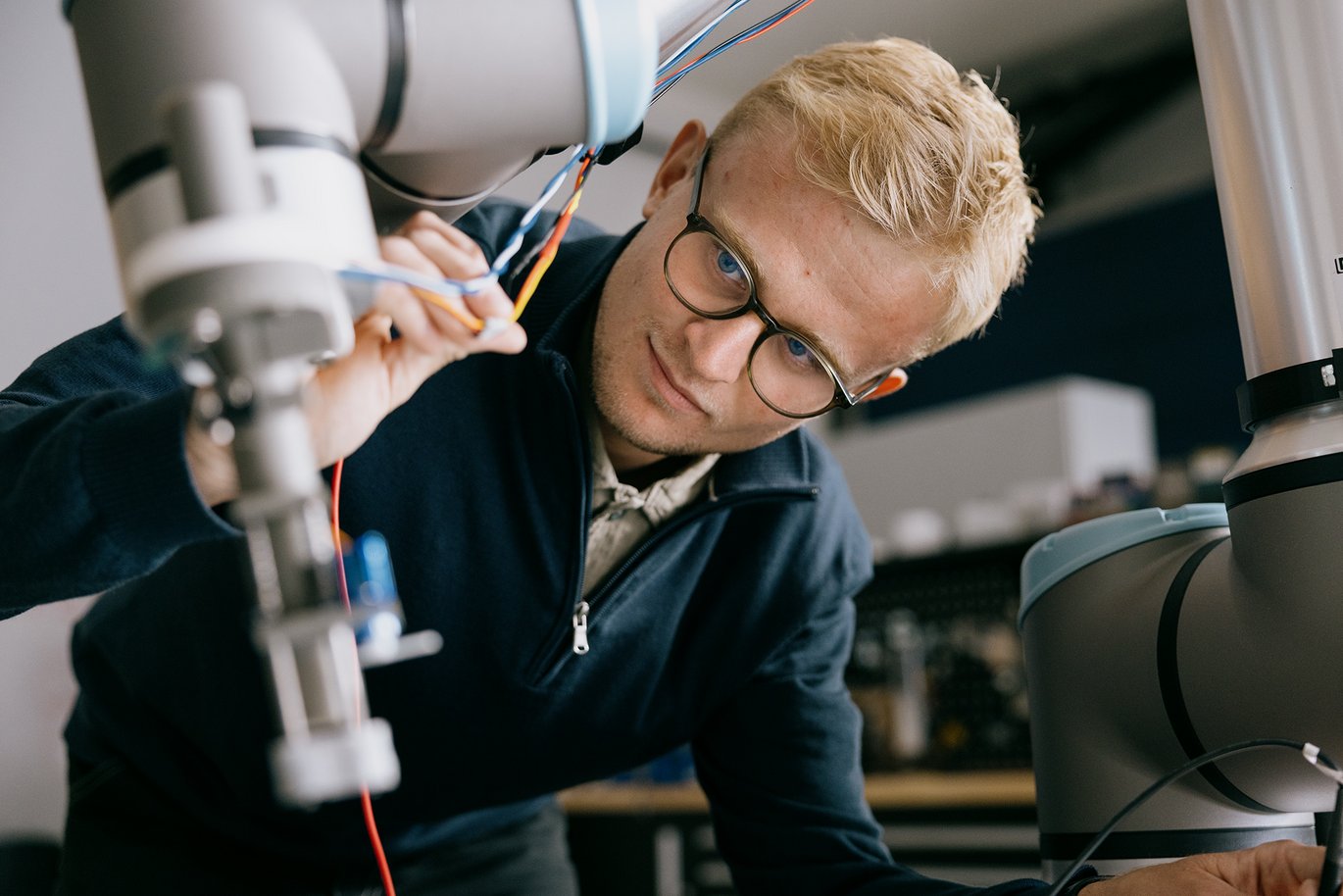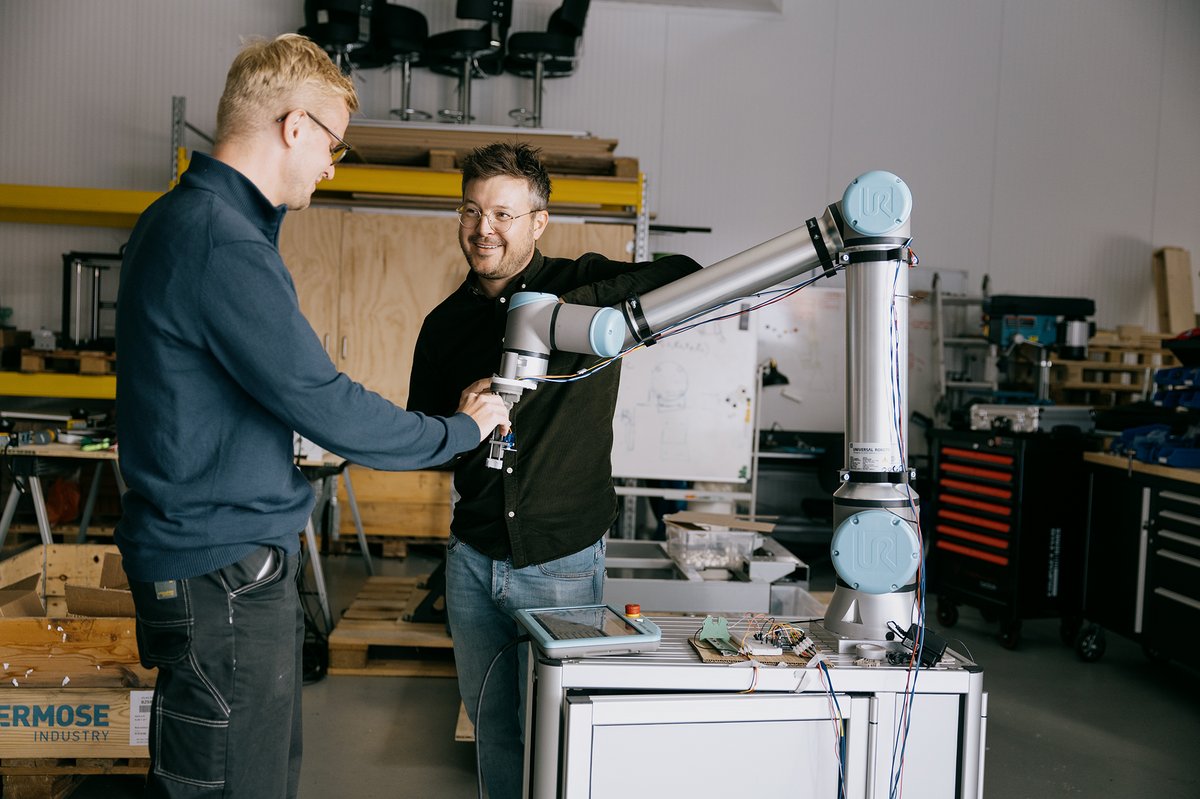Tech launches six new work-integrated Master’s degree programmes
In 2026, Aarhus University will offer all MSc in Engineering programmes as work-integrated Master’s degree programmes. This means students can begin their careers while completing their graduate studies.

“The job market is calling. I know there are great opportunities out there, but I also have a strong desire to become a graduate engineer. To me, the work-integrated Master’s degree programmes is the perfect dual solution,” says Johannes Handberg Dalsgaard, a student at the Department of Mechanical and Production Engineering at Aarhus University.
In January, he will graduate with a BEng in Mechanical Engineering and immediately continue with a three-year professional MSc in Engineering. He has already made an agreement with the company where he currently works as a student assistant. There, he will be involved in developing robotics technology – something he’s very excited about.
“I’ll be able to specialise theoretically in automation technology and mechatronics, which are among my main academic interests. At the same time, I’ll be gaining professional experience. It’s a huge opportunity, and I’m really looking forward to it,” he says.
A new type of collaboration
The six new work-integrated Master’s degree programmes are part of the faculty’s implementation of a new Danish reform of the university sector. Louise Møller Haase, Vice-Dean for Education at the Faculty of Technical Sciences, sees many exciting prospects:
“These programmes open up a new kind of collaboration between universities and industry, which I have high hopes for. It’s a form of knowledge exchange where companies can bring their innovation challenges closer to our curricular activities and help shape the engineers of tomorrow. At the same time, our students get the chance to develop deep academic expertise in practice and begin their engineering careers earlier,” she says.
She highlights that the programmes create a unique dynamic where theory and practice are closely intertwined around the competence needs of industry.
For students, this means a smoother transition into working life, and for companies, it means greater access to university knowledge in ways that are relevant to their technological development.
Strong interest from industry
Aarhus University has already seen strong interest in the new programmes from companies eager to attract young engineers.
One such company is NGIN A/S, which has already signed an agreement for the first work-integrated Master’s degree programmes with a student starting in January 2026. CEO Lasse Korsholm expects fierce competition for the students:
“The work-integrated Master’s degree programmes is a direct channel to the university’s talented engineering students, and we’re already preparing to become an attractive workplace for them, because we believe they’ll be in high demand. For us, it’s very much about talent acquisition, but also about access to new knowledge. We constantly need to build technological competence in our company, and with these students, we gain insight into what’s happening in engineering research environments. There might be a researcher out there with exactly the specialist knowledge we need, who could be linked to the innovation projects our students will work on. It’s a fantastic opportunity,” he says.

Several companies that the university has been in contact with also highlight the programme as an attractive continuing education option for the many BEng graduates produced by Danish universities each year.
“Companies can use the programmes to attract talented graduates by offering them an appealing path to further education. We see great potential in that,” says Rasmus Bering, CEO of DAI – Danish Architects and Engineers.
The new programmes are designed so that students, together with companies, can choose between two different formats:
One year of full-time study at the university (with student grants), followed by two years of part-time employment in a company (with salary) alongside continued studies, or
A four-year programme with salary, where work and study alternate throughout the entire period.
Both models lead to the same MSc in Engineering degree (cand.polyt.).
Focus on the right match
During autumn 2025 and spring 2026, Aarhus University will host a series of so-called work-integrated master’s days. All interested companies are welcome and will have the opportunity to meet engineering students from various disciplines.
“Good matches between students and companies are crucial to the success of these programmes, and it all starts with them meeting each other. From the university’s side, we’ll make sure everyone is well-informed and gets off to a good start. At the same time, we want to open up to the surrounding society so that all companies have equal access to the engineering talents of the future, which we know are in very high demand,” says Louise Møller Haase.
Learn more about the work-integrated master’s days (in Danish).
